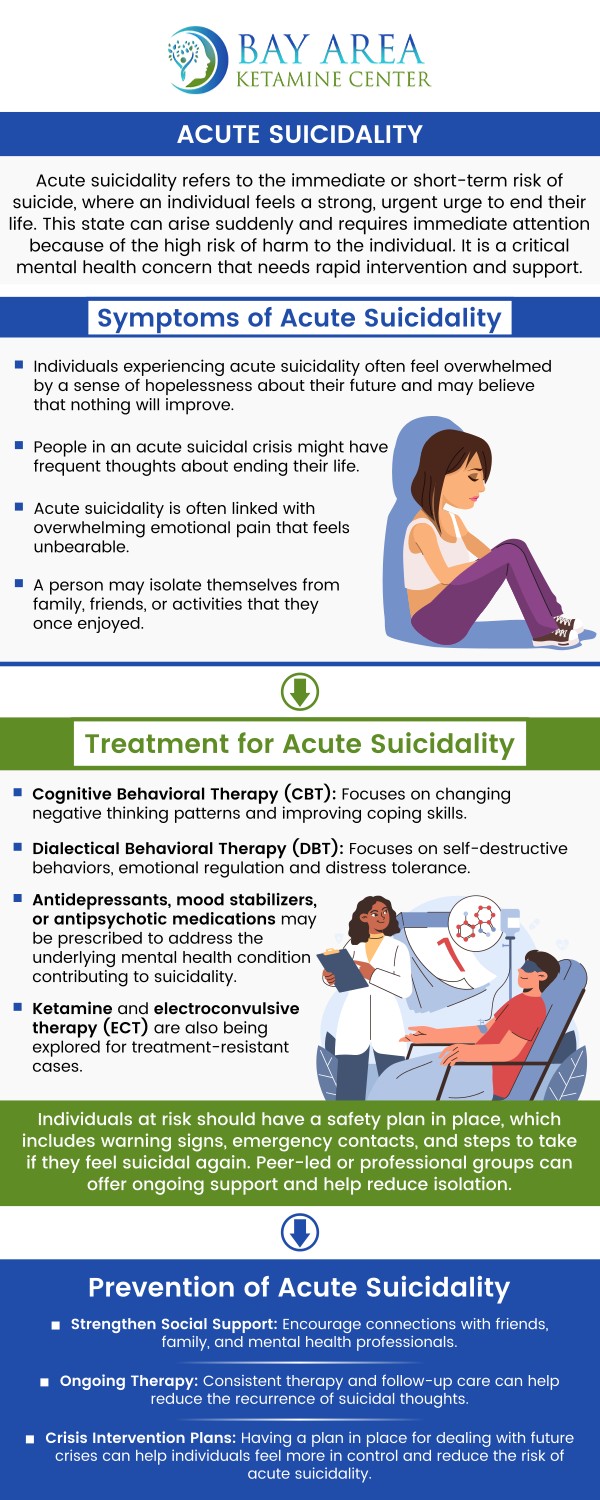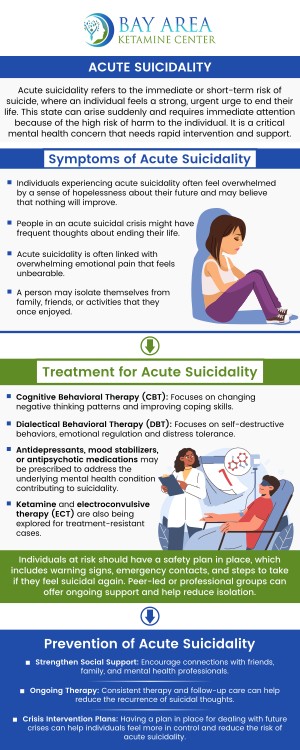Ketamine Therapy for Acute Suicidality Treatment Serving Bay Area, Los Altos CA
Ketamine therapy offers a promising approach for individuals facing acute suicidality by rapidly addressing treatment-resistant symptoms. At Bay Area Ketamine Center, Dr. Paul Wender, MD, provides this innovative treatment, known for its fast-acting potential to deliver relief in critical situations. Ketamine therapy targets mood-regulating brain receptors, giving people who have not responded to traditional treatments hope for mental health improvement under medical supervision. For more information, contact us or schedule an appointment online. We are conveniently located at 746 Altos Oaks Drive Suite B, Los Altos, CA 94024.




Table of Contents:
What are the warning signs of acute suicidality?
What’s the difference between acute and chronic risk of suicidality?
How long do suicidal episodes last?
What help is available for Acute Suicidality?
Life is a beautiful gift. It can bring us joy, happiness, fulfillment and satisfaction beyond measure. However, it can also entail negative feelings which can consume and overwhelm us. While it is normal to fail or feel unworthy at times, if these thoughts and feelings become our central focus, we can lose sight of how wonderful life is. Sometimes, these negative feelings can put suicidal thoughts in our minds, which are incredibly dangerous. It is important to remember that there is always a light at the end of the tunnel, no matter how dark the tunnel may be.
There are several different warning signs of acute suicidality, which fall into two categories: verbal and behavioral.
Verbal signs include:
• Preoccupation with themes of death or suicide
• Expressions of unworthiness or failure
• Lack of interest/hope for the future
• Statements of suicidal plan
• Intention to carry out a suicidal plan
Behavioral signs include:
• Giving away cherished possessions/making a will
• Canceling future plans as if the future does not matter
• Stockpiling pills or acquiring a weapon
• Sending cryptic messages that imply self-harm
Indirect statements will be made out of a cry for help or ambivalence about acting on suicidal thoughts:
• Hopelessness, such as “I feel as if none of this is worth it anymore.”
• Wishes for Escape, such as “I wish all of this would just go away.”
• Death Allusions, such as “I wish I could go to sleep and never again wake up.”
• Burdening Others, such as “Everyone would be happier if I were not here anymore.”
• Not Belonging, such as “No one would miss me if I was gone.”
Acute risk factors include:
When both the above warning signs and risk factors below are present, the risk for self harm increases:
• Expression of specific plans with active intentions of self-harm
• Prior suicide attempts
• Recent discharge from a psychiatric hospitalization
• Chronic feelings of hopelessness and suicidal thinking
Acute risk of suicidality refers to the level of current suicide risk with progression along a continuous sequence of events based on escalating intent and risk. The level of risk also takes into account the extent of the individual’s risk and protective factors.
Chronic risk refers to the ongoing likelihood of a person making a future attempt and is based on historical information, such as history of depression, previous suicide attempts, presence of protective factors, extent of background and current risk factors. Those who have a chronic suicide risk may experience acute suicidal crises.
Duration of suicidal deliberation may last:
• 24% said less than 5 minutes
• 24% said 5-19 minutes
• 23% said 20 minutes to 1 hour
• 16% said 2-8 hours
• 13% said 1 or more days
There are several options available to help acute suicidality, which range from psychotherapy (talk therapy) to medications. Psychotherapy is proven to help allay suicidal thoughts. It does this by addressing suicidal ideation, teaching the patient to frame their thoughts in a more positive manner. One of the most effective treatments for acute suicidality is ketamine therapy when used in a clinical setting. While it is relatively new in the treatment for acute suicidality, it has shown to be highly effective when administered by a certified anesthesiologist.
If you are having suicidal thoughts or ideations, come to the Bay Area Ketamine Center today. Our board-certified anesthesiologist is experienced in treating acute suicidality with ketamine infusions and can help you improve your mental health. For more information, contact us or schedule an appointment online. Visit our clinic conveniently located at 746 Altos Oaks Drive Suite B, Los Altos, CA 94024. Our office is open five days a week, from Monday to Friday, during the hours of 10 AM to 6 PM. We look forward to serving you! We serve patients from Los Altos CA, Sunnyvale CA, Palo Alto CA, Stanford CA, Atherton CA, Cupertino CA, Santa Clara CA, Mountain View CA, Loyola CA, and surrounding areas.

Check Out Our 5 Star Reviews







